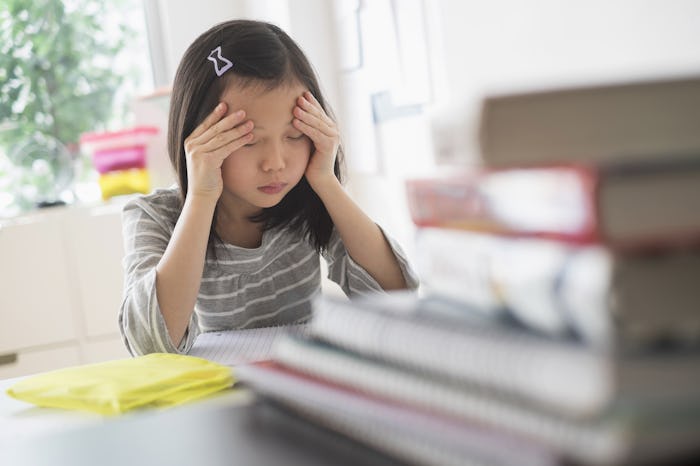Life

How To Talk To Your Kids About Anxiety, Because It Starts Young
I'll never forget the day the principle of my junior high called me into her office and called me a "Nervous Nelly." I knew I was an anxious kid, but even as a young person, I wish my parent had learned how to talk to your kid about anxiety that don't involve name-calling. Granted my junior high principle wasn't my mom, but she was an authority figure that I looked up to. And this incident really impacted me, and not in a good way.
According to the Anxiety and Depression Association of America, (ADAA) anxiety disorders affect one in eight children. Research shows that if untreated, anxiety disorders are at higher risk to perform poorly in school, might miss opportunities to socialize, and might engage in substance abuse later in life.
Once diagnosed and properly treated, however, your kid can overcome anxiety. Another article by the ADAA noted that in order to prevent anxiety from crippling your kid, inform yourself about the different types of childhood anxieties out there. Not all anxiety is the same: From Generalized Anxiety Disorder (GAD) to Social Anxiety Disorder to phobias and panic, children's anxiety manifests in various ways. But before you jump the gun and diagnose your kid, first have an open dialogue. The following are suggested ways to talk to your kid about anxiety.
1Be Empathic
The organization Anxiety BC underscored the power of empathy in talking to your kid about anxiety. Begin the discussion by talking about things that make you anxious, and then invite your child to share his or her worries. Remember, you're the center of your kid's world, and though you might be a super mom, you're not actually a super hero, and it's important your kid sees you as human.
2Be Reassuring
Psychologist Tamar Chansky told Parents that, "no matter how much you answer an anxious child's questions or tell her things are fine, she can't absorb your reassurances." But don't give up. The same article noted that anxiety is one of the most treatable psychological disorders in kids, so be perseverant in reassuring your child that he or she is safe, and capable of overcoming anxiety.
3Be Able To Acknowledge Your Kids' Worries As Real
One way to make sure you're not minimizing your kid's anxiety is to acknowledge it as real. At the same time, you want to teach your kid skills to determine distorted thinking from realistic worry, or so noted The Huffington Post. Help your kids break down thoughts. Once your kid is able to identify distorted thinking and challenge it, what's "real," isn't contingent on someone else anymore. And that's an awesome feeling (notes this former Nervous Nelly).
4Offer Prompts, Because Some Kids Might Not Open Up Right Away
Anxiety BC suggested opening the discussion with a prompt, especially if your kid is on the younger side. For example, try saying something like, "I know some kids are scared of ___. Do you have that fear too?" It's vital to be specific about feelings of anxiety.
5Teach Kids To Identify Physical Signs Of Anxiety
Everyday Health noted that physical signs of anxiety include a pounding heart, shortness of breath, and sweating. Teach your kid that anxiety lives in the body, even though it might originate in the imagination, or a real life situation. For younger kids, try using the Chester the Cat diagnostic. For older kids, use the diagnostic Where's Anxiety In The Body? (Both provided by Anxiety BC.)
You might also want to check out this podcast suggested by the ADAA about stomachaches and anxiety in children, as this ailment is one of the most common physical signs in kids.
6Empower Kids To Speak Back To Anxiety
Once kids know how to identify anxiety, the ADAA suggested that kids have coping strategies to speak back to anxiety, depending on what type of anxiety your kid has. Respectively,
7Reassure Your Kid That Anxiety Is A Fleeting Feeling
According to HealthCentral, anxiety is a temporary feeling, and it passes. This might be a hard concept for your kid to grasp, as I'm still struggling with this one, but, with every challenge comes a reward, or at the very least, a lesson, right?
8Talk About Coping Skills, Like Breathing Techniques
Another article in Parents noted that yoga practices to integrate body and breath can relieve anxiety in kids. By focusing on the postures as well as the breathing, yoga is an awesome coping strategy for a kid who has anxiety. It keeps a young person in the moment, and concentrated in the practice. The same article in Parents claimed yoga can boost a child's self-esteem.
9Offer Solutions To Help Your Kid Visualize A World Without Anxiety
Anxiety BC suggested you help your child visualize a world without anxiety. However, rather than being abstract about this so-called world, try asking the following questions as part of an exercise:
If you woke up tomorrow morning and all your anxiety had magically disappeared, what would you do?
How would you act?
How would your family know you weren’t anxious? (Your teacher? your friends?)
With these concrete examples, you can help your child manage anxiety throughout life.